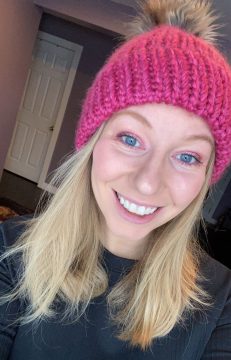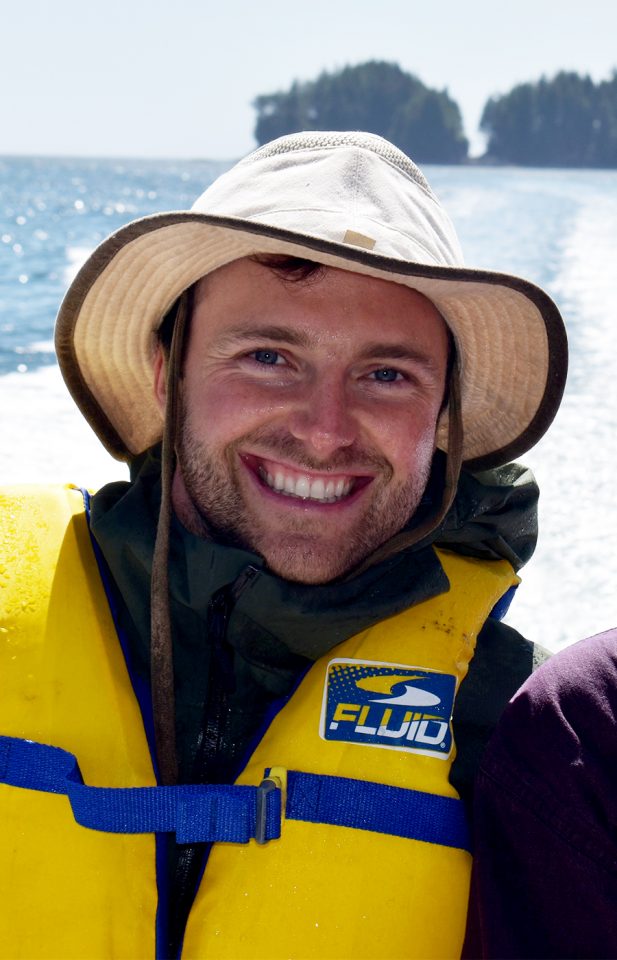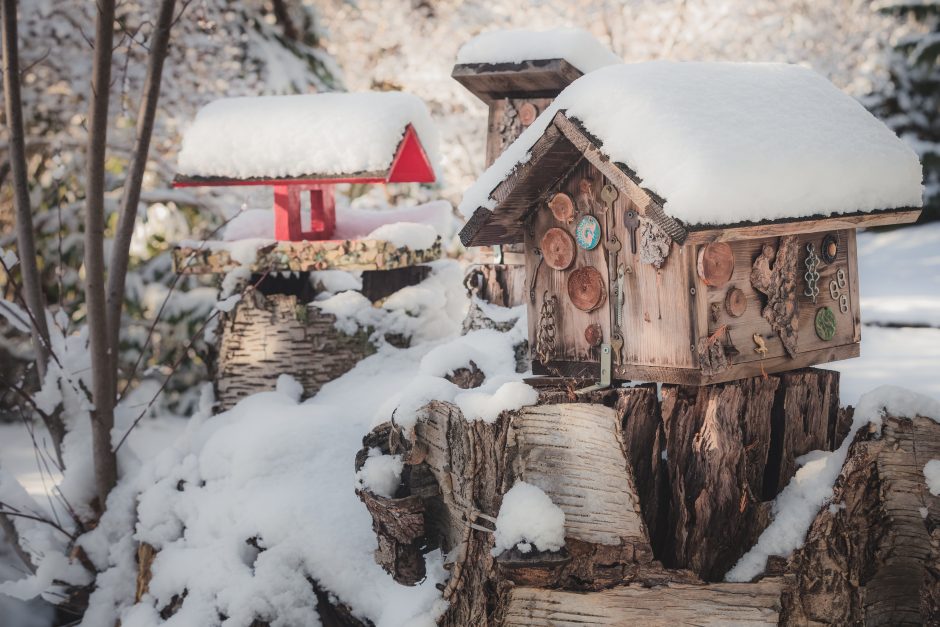
The 11-month West Kootenay Rural Teacher Education Program (WKTEP) is located in Nelson, BC and surrounding communities. WKTEP has a strong focus on rural and small school settings, recognizing that they offer exciting educational opportunities for teachers.
In fall 2023, six WKTEP graduates shared their experiences of their time as teacher candidates in the UBC Bachelor of Education program.
Click the accordion headers below to read their stories.
Tianna Page

Tianna Page is a graduate of the West Kootenay Rural Teacher Education Program (WKTEP). Prior to enrolling in WKTEP Elementary, Tianna was living in the West Kootenays, working as a child and youth care worker in an alternative high school.
I already had a degree in psychology and English and was contemplating going into counselling or teaching. After spending time with students in schools, I realized I wanted to go into teaching.
How did you hear about WKTEP?
I first heard about WKTEP through the principal at the school I was working at. At the time, she was teaching a math course for WKTEP. When she realized I had a degree, and we talked about my long-term goals, she suggested WKTEP. At the time, I actually told her I planned on working for a few years and then pursuing a masters in counselling instead.
What inspired you to go into teaching?
When I was working at an alternative high school, I realized what an amazing impact educators could have on a student. It’s so important for students to feel safe, cared for, and seen. I realized that I had the ability to be a positive force in a child’s life, and by going into teaching, I could design learning experiences that are diverse and inclusive for all.
Did you have a favourite educational topic or class that you especially loved, or one that made an impression on you?
I loved the social justice classes. I found them interesting and engaging. In retrospect, it was probably the CORE courses that had the biggest impact on me. In my interviews and post-graduate courses, I am constantly told that I have an incredibly strong teaching pedagogy. All the work during the CORE courses helped me understand exactly what type of teacher I want to be. This pedagogy is the framework and foundation of my classroom. I use this knowledge every single day to guide the way I interact with the world. At the time, I wouldn’t have said that CORE was my favourite. Looking back now, I realize CORE made the biggest impression on me, and has influenced my professional life the most.
Have you encountered any challenges or learning curves, and if so how did you overcome them?
Nothing could have prepared me for report cards. I did them during practicum, and yet, it was still a harrowing task. Trying to figure out how to organize the learning standards, navigate myedbc, report in authentic ways, all while teaching a split class was challenging. I overcame this learning curve by asking experienced teachers for guidance. I asked tons of questions. I collaborated with colleagues. I couldn’t have done it without them!
What was your biggest takeaway from practicum?
When you are using inquiry in your own classroom, it is vastly different. It helps to understand what inquiry looks like from the student’s perspective. Inquiry learning (or project-based learning) is an incredible way to create meaningful learning experiences that provide access points for all students. In diverse classrooms, creating projects that keep students engaged and learning is so important.
My biggest take away from practicum is to remember that your inquiry project is meant to help show you how the process works. At the time, it might feel like just another thing you need to do, or just another step you need to take. It can feel stressful during an already stressful time. When you are using inquiry in your own classroom, it is vastly different. It helps to understand what inquiry looks like from the student’s perspective. Inquiry learning (or project-based learning) is an incredible way to create meaningful learning experiences that provide access points for all students. In diverse classrooms, creating projects that keep students engaged and learning is so important. You can use inquiry for any age group. I use it in my K/1 classroom and it is wildly successful. Start by understanding that your inquiry in your practicum is meant to help you understand the process you’re going to use with your students one day.
What is the one piece of advice you would like to give to a potential WKTEP student?
One piece of advice I would offer is to stay flexible and open-minded. Take risks in your practicum. Make mistakes, fail, and then try again. When you have your own classroom, do the same thing. This profession is all about being a life-long learner. Keep pushing yourself to try new things and to find ways to continue learning. Don’t be afraid to collaborate with colleagues and learn from each other. This profession is filled with wonderful, amazing people who are often just as eager to learn from you.
Graham Muncaster

Graham Muncaster came to WKTEP by way of Quebec and Kimberley, BC. As a WKTEP Elementary teacher candidate, Graham drew from his past experience working with autistic children and adults in and outside of classroom settings.
Building connection and trust with your students and the community takes time, but it is my most rewarding aspect of teaching.
How did you hear about WKTEP?
I heard about WKTEP when I was living in the East Kootenays. A friend brought the program to my attention as I was working towards becoming a teacher, and WKTEP was in line with my goals.
What inspired you to go into teaching? Why is rural education important to you?
After canoeing the Coppermine River in the Northwest Territories and Nunavut, weather led to our group being unable to be picked up in Kugluktuk, Nunavut. I was able to spend this time meeting community members and youth who shared some of their lives and experiences with me. This formative experience led me to teaching and living in the Ehattesaht First Nation community in Zeballos during my WKTEP practicum. I am very grateful to have been welcomed by the Ehattesaht community and appreciate all the connections I made during that time.
I am also very grateful to WKTEP and my faculty advisor Tim Huttemann for setting up this practicum. This year in conjunction with high school teacher Chris Rolle and the Zeballos community, we set up an exchange between the Nelson Waldorf School and Zeballos Elementary Secondary School. During this exchange, youth and adults from both communities connected and shared their lives with one another. It is these connections, often made outside of the classroom, that I believe are important for our youth to learn and grow together.
Outdoor education has been crucial to the success of my grade 9 class at Nelson Waldorf School this past year. As a group, we were able to build trust outside of the classroom, go to the edge of our comfort zones and grow beyond. This led to the students building confidence in both themselves and their classmates.
Did you have a favourite educational topic or class that you especially loved, or one that made an impression on you?
Outdoor education has been crucial to the success of my grade 9 class at Nelson Waldorf School this past year. As a group, we were able to build trust outside of the classroom, go to the edge of our comfort zones and grow beyond. This led to the students building confidence in both themselves and their classmates. It was the most important aspect of my students’ preparations for grade 10 at LVR.
Have you encountered any challenges or learning curves and if so, how did you overcome them?
I have overcome challenges with support and connection to those around me.
What was your biggest takeaway from practicum?
Building connection and trust with your students and the community takes time, but it is my most rewarding aspect of teaching.
What is the one piece of advice you would like to give to a potential WKTEP student?
Request a practicum in a remote community. You will learn much more than you’ll teach.
Theresa Gerritsen

Theresa Gerritsen was living in Creston, BC, working online as an ESL teacher when she made the decision to enrol in the WKTEP Secondary program.
Can you tell us a little bit about your background?
I have a BSc in biology. I came to WKTEP having a few careers under my belt including marine mammal biologist, media relations, fundraising and crisis counsellor. I have travelled extensively and had my own businesses making documentary films and also leading meditation retreats.
How did you hear about WKTEP?
A friend of mine was in the first cohort.
What inspired you to go into teaching?
I was looking for a new career. Teaching online felt natural for me and I knew teaching was something that would be ever-changing and hold my interest and excitement in the long term.
Did you have a favourite educational topic or class that you especially loved, or one that made an impression on you?
I love learning ways to include all students in the classroom through project-based learning, voice and choice. In particular, I love teaching math. There aren’t a lot of examples of project-based learning for higher math classes, and there is so much to learn about and create.
Have you encountered any challenges or learning curves, and if so how did you overcome them?
Experiential, project-based learning has a lot of challenges in the classroom, especially for a new teacher who is also learning how to manage student behavior and class time. Additionally, there aren’t a lot of classes doing experiential learning in my school and there are limited resources online. I have had to rely on brainstorming with teachers in my school and getting creative. Sometimes this means I am learning alongside the students. I try to let go of my expectations and go easy on myself when it feels like “lost” time in class. I’m creating a learning environment for my students now and 10 years from now.
What was your biggest takeaway from practicum?
Classroom management is required to get anything interesting done. Community building is needed, but a loose structure results in wasted time and disrespect from students.
We are the new wave of teachers who are tasked with truly bringing the innovative, inclusive BC curriculum to fruition in our schools.
What is the one piece of advice you would like to give to a potential WKTEP student?
We are the new wave of teachers who are tasked with truly bringing the innovative, inclusive BC curriculum to fruition in our schools. Sometimes we don’t have a model of what this looks like in action, and we need to allow ourselves to experiment and make mistakes in our classrooms. Sharing our victories and failures with other teachers can serve as a model to others.
Amy Stewart
Amy Stewart was already living in Nelson prior to attending the WKTEP Elementary program. A fourth generation Settler from Europe, Amy has a Bachelor of Arts from Simon Fraser University and a one-year diploma in life coaching and counselling from Rhodes Wellness College. Amy is currently completing a Master in Education: School Counselling from City University of Seattle.

How did you hear about WKTEP?
I heard about WKTEP from family friends who are administrators in the area.
What inspired you to go into teaching?
My long term goal always had teaching in mind. I love learning new things and working with children. The WKTEP program, deeply rooted in place based learning, provided me the opportunity to learn to be a teacher while also considering this place I call home. Connecting my love for learning and teaching to the land and the community was important to me. I am so grateful that I had the opportunity to learn in this way.
The WKTEP program, deeply rooted in place-based learning, provided me the opportunity to learn to be a teacher while also considering this place I call home. Connecting my love for learning and teaching to the land and the community was important to me.
Have you encountered any challenges or learning curves, and if so how did you overcome them?
Balancing my family life, work life, and school life had its challenges while being in WKTEP. Knowing my limits and creating support systems helped me hold strong when the load was maxed out.
What was your biggest takeaway from practicum?
My biggest takeaway from practicum was the feeling of being capable but also realizing that my journey to becoming fully competent as a teacher had only just begun. Teaching is a craft that one refines over time. The practicum allowed me to get a feel for the craft of teaching and set me on my path of continuous learning.
What is the one piece of advice you would like to give to a potential WKTEP student?
Enjoy the experience; connect with your colleagues, instructors, and the land. The gift of this program is found through the integration of these connections and a love for learning.
Kaylah Lewis
Kaylah came to WKTEP (Elementary cohort) by way of Creston after hearing about the program by word of mouth and through her research online for BEd programs. She has a Bachelor of Science in Natural Resources Conservation, majoring in Science and Management from UBC Vancouver and a Bachelor of Education (WKTEP).

What is your background?
Historically, mostly Scottish. On my mom’s side John Cooper was the first to come to North America. He worked for the HBC and eventually was a Red River settler. On my dad’s side Stephen Hopkins was the first to come over, first on another boat (arriving in 1610 and staying in Jamestown to 1614 and again with his family on the Mayflower in 1620.
Career: [I had] many different work experiences ranging from Parks Canada, researcher for the UVic ethnoecology lab working with Indigenous elders in the NWT, to making brooms here in the Kootenays.
What inspired you to go into teaching and why is rural education important to you?
I have a wide variety of life experiences to share and I see it as a valuable career where I can both have stability in my life and give back to the community.
I have a wide variety of life experiences to share and I see it as a valuable career where I can both have stability in my life and give back to the community.
Do you have a favourite educational topic/class that you especially love, or one that made an impression on you?
Science was my most comfortable with my educational experience but I pull ideas from all of them now that I am teaching.
Have you encountered any challenges or learning curves and if so, how did you overcome them?
Learning that it is okay not to mark everything and increase their self and peer reflection quality through scaffolding and practice.
What was your biggest takeaway from practicum?
Work life balance is essential.
What is the one piece of advice you would like to give to a potential WKTEP student?
Get outside as much as possible. Make time for your wellness or you will be forced to take time for your illness.